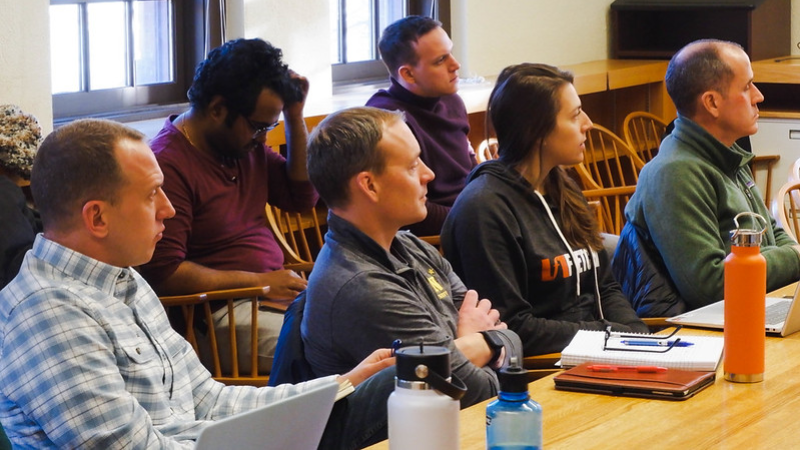Doctoral Dissertations
All Fletcher doctoral students write dissertations. Please see examples of previous doctoral dissertations on Russia and Eurasia below:
Don’t Blame the Generals: A Policy-Focused Theory of Erosion for Civilian Control (Polina Beliakova, 2022)
NATO Nuclear Burden-Sharing Post-Crimea: What Constitutes “FreeRiding”? (Robert G. Bell, 2021)
Authoritarian Resurgence. Power, Politics and the Making of Foreign Policy in Russia and China (Torrey Elizabeth Taussig, 2018)
Strategic Cyber Deterrence (Christopher Fitzgerald Wrenn, 2012)
Democracy Across The Airwaves. The Strategic Work Of American International Broadcasting In Azerbaijan And Iran (Lauren Naomi Brodsky, 2010)
The Social Construction Of Turkish Vatan. Geography And Foreign Policy (Behlül Özkan, 2009)
Holding Fire. Security Force Allegiance During Nonviolent Uprisings (Anika Locke Binnendijk, 2009)
Revisiting the Geo-Political Thinking of Sir Halford John Mackinder. United States-Uzbekistan Relations, 1991–2005 (Chris Seiple, 2007)
From Frozen Conflicts to Unrecognized Republics. The de facto States in the Emergent Region of the Post-Soviet States of the South Caucasus (Ara Ghazarians, 2007)
Tanks Have Left, Gazprom Is Back. Russian Energy Companies’ Expansion Towards Poland, Slovakia And Hungary Between 1991 And 2004 (Anita Orban, 2007)
Felix Austria? Cold War Security Policy between NATO, Neutrality, and the Warsaw Pact, 1945-1989 (Andrew Earl Harrod, 2007)
The Intellectual Roots of Reagan’s Strategy (Francis Herbert Marlo, 2006)
Cosmetic Democracies. Political Development and ICTs in Post-Communist Armenia (Audrey N. Selian, 2005)
The Formation Of Kyrgyz Foreign Policy 1991-2004 (Thomas J. C. Wood, 2005)
Evaluating Third-Party Intervention In Estonia, Moldova And Ukraine. The Case For Multidimensional Prevention (Angela Kachuyevski, 2005)
The Delusion Of Coercive Peacemaking In Identity Disputes. The Case Of The Former Yugoslavia (Marta Vrbetic, 2004)
Security In The Russian Environment. State-Civic Contention in the Nuclear Defense Complex (Wendin Davis Smith, 2003)
Fink Origins Of Intervention. Western Traditions Of Thinking About International Politics And NATO’s Intervention In The 1999 Kosovo Crisis (Susan Dorothy, 2003)
The Frozen Conflict Between The United States And Iran. Causal Patterns Prior To The Coup D ’Etat Of 1953 And Contemporary Attitudes Of Hostility (Nils Jordet, 2002)
False Transformations From Stalin’s Peasants to Yeltsin’s Collective Farmers (Maria Amelina, 2001)
The Sources Of Ethnic Violence A Comparative Case Study Analysis of Yugoslavia, Nagorno-Karabakh, and Kurdistan (Querine H. Hanlon, 1998)
Frontier Equity Market Valuation Securities’ Return Behavior, Informational Efficiency, and Valuation in a Pre-Emerging Equity Market. The Case of Russia (Oliver S. Kratz, 1998)
An Analysis of the Foreign Economic Policies of the Central Asian States and Azerbaijan 1992-1996 (Mian Asad Hayaud Din, 1997)
On The Rocks. Gorbachev And The Kurile Islands (Lisbeth Tarlow Bernstein, 1997)
Strategic Liberalization. Development Through Competition in Wireless Communications (Brian Regli, 1996)
A Diplomatic History of German Unification, 1989-1990 (Philip D. Zelikow, 1994)
Struggling Towards Space Doctrine. U.S. Military Space Plans, Programs, and Perspectives During the Cold War (Peter Lang Hays, 1994)
The End of Empire – Russian and Soviet Imperial Development and Decline (Ariel Cohen, 1994)
Admiral Gorshkov and Russia’s Naval Heritage – a Quest for Strategic Mobility (Kenneth Wayne Malbon, 1993)
Soviet Decision-Making. A Comparative Analysis of the Interventions in Hungary (1956), Czechoslovakia (1968), and Afghanistan (1979) (Johanna Cushing Granville, 1992)
A New Look at the 1956 Hungarian Revolution. Soviet Opportunism, American Acquiescence (Martin Ben Swartz, 1988)
The Limits of Mutual Restraint. Arms Control and the Strategic Balance (Steven Edward Miller, 1988)

